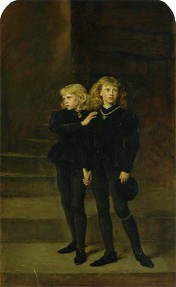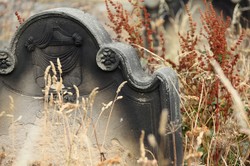 Many years ago, I was speaking with two elderly relatives about family history. As they gave me facts and recounted stories, I took notes.
Many years ago, I was speaking with two elderly relatives about family history. As they gave me facts and recounted stories, I took notes.
They could see names being recorded in our genealogy, all given equal weight of importance, as they took their places according to blood-lines. Innocuous, and somewhat bland, unless a tidbit about them enriched their entry in the family tree.
Suddenly my great-auntie burst out an accusation, "He was a right 'un!" She looked shaken by having said it, so full of bitter emotion.
Her cousin looked shocked and spoke with a hint of reproval, "Now come on, it was a long time ago."
It certainly was. According to my newly scribbled notes, the individual had been dead for nearly seventy years. But my great-auntie could see his name nestling alongside her mother, her grandmother, his siblings and his wife. The proximity was more than she could bear, when they were all being treated the same, in a document which was being carried forward. She and her cousin were the last people alive who'd known him. They were the last ones to know what he was really like.
"He beat his wife, you know. And his mother! My Nan used to hear him coming home from the pub. He had to pass her house to get to his own. She used to blow out the candle and hide behind the settee, until he was gone. Then his wife would get it instead!"
Her cousin tutted, "She doesn't want to know all this."
I did and I should. My great-auntie had grasped the situation perfectly. I was the family historian and whatever I wrote down now became the truth. It would potentially be read by all generations to come. Why should a man like that be rendered blameless, by sheer dint of having decayed?
"But your grandad laid him out." My great-auntie concluded triumphantly. "He walked in and caught him belting his wife one day. So your grandad punched him out stone cold." There was a sweet satisfaction in that smile. There was the knowledge that this was also being added to the record. Her brother, my grandfather, had the courage to stand up to such a man.
Everyone in this story was deceased, but there were truths aching to be told. My great-auntie had waited seven decades biting her tongue, not wishing to speak ill of the dead. But now she'd gained retribution on behalf of her own auntie and grandmother. She'd had the final word, and every generation hereon would know it.


 In a court of law, the final summing up is usually the most important aspect of a grand trial. The jury will have sat through reams of evidence and testimonies. Now it's the turn of the prosecution and defense to help those present to make sense of it all.
In a court of law, the final summing up is usually the most important aspect of a grand trial. The jury will have sat through reams of evidence and testimonies. Now it's the turn of the prosecution and defense to help those present to make sense of it all.


 We all want to be understood. We want everyone to remember us fondly, particularly once we're dead and buried. We want our lives to have meant something, and that thing to be quite wonderful.
We all want to be understood. We want everyone to remember us fondly, particularly once we're dead and buried. We want our lives to have meant something, and that thing to be quite wonderful.
 Many years ago, I was speaking with two elderly relatives about family history. As they gave me facts and recounted stories, I took notes.
Many years ago, I was speaking with two elderly relatives about family history. As they gave me facts and recounted stories, I took notes.




 Guest
on 04/09/2013
Guest
on 04/09/2013









 St Tydecho's Churches in West Waleson 09/03/2014
St Tydecho's Churches in West Waleson 09/03/2014
 Goodies for an Outlander Premiere Partyon 03/06/2015
Goodies for an Outlander Premiere Partyon 03/06/2015
 Holocaust Memorial Day Interview with Rainer Höss, Grandson of Rudolf Architect of Auschwitzon 01/24/2015
Holocaust Memorial Day Interview with Rainer Höss, Grandson of Rudolf Architect of Auschwitzon 01/24/2015
 Romantic Valentine Gifts for an Outlander Fanon 01/16/2015
Romantic Valentine Gifts for an Outlander Fanon 01/16/2015



Comments
Thank you very much, and I still stand by that one.
"Respect in death should be earned in life."
You said it. I'm just repeating it because it bears repeating.
You've put your finger on precisely the reason that 'don't speak ill of the dead' is a thing. It's either those half-understood kernels of truth, or the story dies with the only person left who knew a thing. Which is the best way forward?
I'm not sure how I feel about family history stories. The person being spoken about is dead and the people who are relating stories may have different views on what happened - especially children who don't always understand what's going on. Now if several people all said the same thing, or there was some type of documentation, that's different.
True. True. And well put.
Family history is like archaeology. When you dig you eventually unearth skeletons.
Family history is such a minefield for these things, isn't it? The trouble is that ideas of what's right and wrong, scandalous or acceptable, change over the generations. What may be a big deal to the older generation is nothing to us.
One of the problems that I had was realising that I was seeing my ancestors like characters in a story. They'd been dead long before my time, so there wasn't that emotional connection. But I'd be speaking with people who actually had known them. Once I'd recognized I was doing it, I was able to approach it slightly more appropriately.
Your grandmother reminds me a lot of mine. She too worried about what I was going to find digging about in Blaenafon. I never did discover what was worrying her so much.
Thanks for commenting!
And isn't speaking "ill" a matter of perspective? When researching my own family history my grandmother consistently became disgusted when I started to reiterate what I had uncovered thus far on her side (in addition to what she had voluntarily disclosed/shared). She'd say, "I don't know why you want to know so much about a bunch of dead people" yet she spoke of them frequently in a few favorite storys in particular. When I discovered her brother had run away because he didn't want to go to school and went to his uncles house in another town only to be sent back home...I realized that was her "secret". Something she didn't want anyone to know for some reason or another. It was speaking "ill" of him in her mind! Great article! I enjoyed it.
Thank you for reading it. And yes! I had my eye on those too. It's refreshing to see an author just come out with it.
I enjoyed reading your article and the comments. I am also intrigued by the Jerks series. I would be interested to read a book or two.